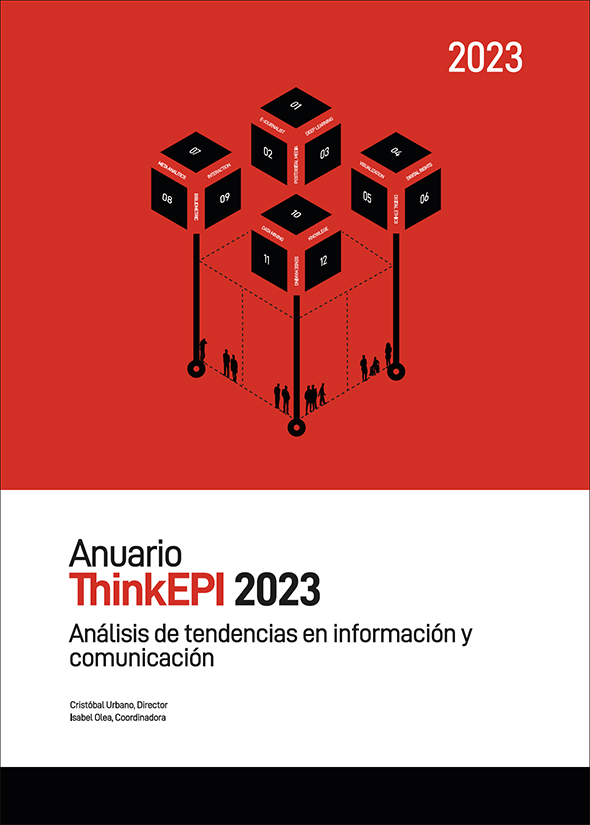Why we avoid the news. Some evidence from the inequality of access to digital information in Spain
DOI:
https://doi.org/10.3145/thinkepi.2023.e17a34Keywords:
News consumption, News avoidance, Inequality, Digital media, SpainAbstract
The consumption and eventual avoidance of digital news shows differential characteristics related to economic inequality in Spain. As a polarized democratic system, according to Hallin and Mancini’s 2004 classification, Spain has some features that are somewhat different from other countries. According to data obtained from a survey carried out in the beginning of 2022, a quarter of those who responded -in an appropriately stratified way- stated that they have little trust in digital news from the media. Half of them indicate that the reason for avoiding news consumption, at least directly -incidental consumption is another matter- is the media’s lack of credibility, even greater than that attributed to journalists. Furthermore, social class -that is, economic income, in addition to factors such as educational background- influences how news is consumed. The most disadvantaged classes avoid direct access to the media more, as do the upper classes, though for different reasons, most likely because they obtain information through other channels.Downloads
References
Banjac, Sandra; Hanusch, Folker (2020). “Aspirational lifestyle journalism: The impact of social class on producers’ and audiences’ views in the context of socio-economic inequality”. Journalism, v. 23. n. 8, pp. 1-19. https://doi.org/10.1177/1464884920956823
Boczkowski, Pablo J.; Mitchelstein, Eugenia; Matassi, Mora (2018). “News comes across when I’m in a moment of leisure: Understanding the practices of incidental news consumption in social media”. New media and society, v. 20, n. 10, pp. 3523-3539. https://doi.org/10.1177/1461444817750396
Chadwick, Andrew (2013). The hybrid media system: Politics and power. Oxford: Oxford University Press. ISBN: 978 0199759484
Costera-Meijer, Irene; Rogers, Richard; Westlund, Oscar; Witschge, Tamara; Díaz-Noci, Javier; Serrano-Telleria, Ana (eds.) (2021). Researching the news in the Hybrid media system: An expert panel report. Barcelona: DigiDoc Research Group (Pompeu Fabra University), DigiDoc Reports. PONR04/2021. http://hdl.handle.net/10230/47055
Edgerly, Stephanie (2022). “The head and heart of news avoidance: How attitudes about the news media relate to levels of news consumption”. Journalism, v. 23, n. 9, pp. 1828–1845. https://doi.org/10.1177/14648849211012922
España (2014). “Ley 21/2014, de 4 de noviembre, por la que se modifica el texto refundido de la Ley de Propiedad Intelectual, aprobado por Real Decreto Legislativo 1/1996, de 12 de abril, y la Ley 1/2000, de 7 de enero, de Enjuiciamiento Civil”. BOE, n. 268, 5 noviembre. https://www.boe.es/eli/es/l/2014/11/04/21
Fitzpatrick, Neill (2022). “No news is not good news: The implications of news fatigue and news avoidance in a pandemic world”. Athens journal of mass media and communications, v. 8, n. 3, pp. 145-160. https://doi.org/10.30958/ajmmc.8-3-1
Gil de Zúñiga, Homero; Cheng, Zicheng (2021). “Origin and evolution of the News Finds Me perception: Review of theory and effects”. Profesional de la información, v. 30, n. 3. https://doi.org/10.3145/epi.2021.may.21
Goyanes, Manuel; Ardèvol-Abreu; Alberto; Gil de Zúñiga, Homero (2023). “Antecedents of news avoidance: Competing effects of political interest, news overload, trust in news media, and ‘News Finds Me’ perception”. Digital journalism, v. 11, n. 1. https://doi.org/10.1080/21670811.2021.1990097
Masip, Pere; Suau, Jaume; Ruiz-Caballero, Carlos (2020). “Incidental exposure to non-like-minded news through social media: Opposing voices in echo-chambers’ news feeds”. Media and communication, v. 8, n. 4, pp. 53-62. https://doi.org/10.17645/mac.v8i4.3146
Pérez-Altable, Laura; Díaz-Noci, Javier (2023a). “Desigualdad de acceso a la información digital en España”. En: Carratalá, Adolfo; Iranzo-Cabrera, María; López-García, Guillermo (eds.). De la desinformación a la conspiración. Política y comunicación ante un escenario mediático híbrido. València: Tirant Lo Blanc, pp. 317-331. ISBN: 978 84 19825 14 8
Pérez-Altable, Laura; Díaz-Noci, Javier (2023b). “Exploring news avoidance in the Spanish hybrid media landscape”. Dígitos, n. 9, pp. 11-28. http://hdl.handle.net/10230/57977
Skovsgaard, Morten; Andersen, Kim (2020). “Conceptualizing news avoidance: Towards a shared understanding of different causes and potential solutions”. Journalism studies, v. 21, n. 4. https://doi.org/10.1080/1461670X.2019.1686410
Downloads
Published
How to Cite
Dimensions


